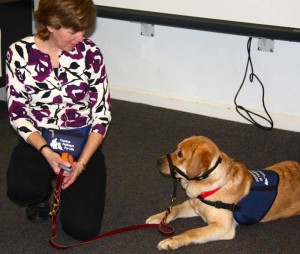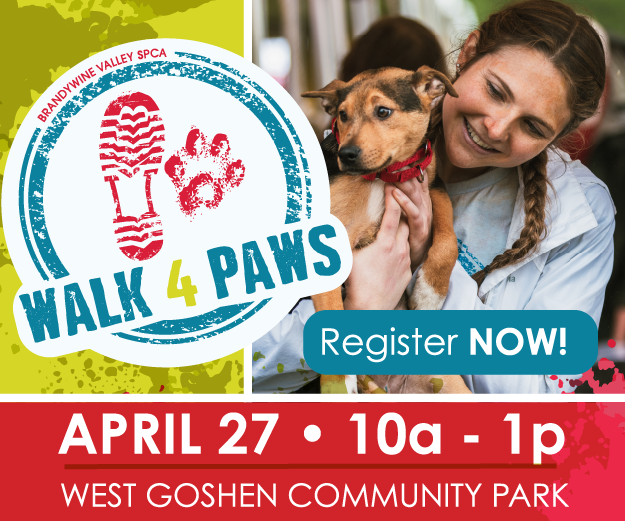Canine Partners For Life adopted by Upland fourth graders as service project

Vicki Chandler works with Patrick during a visit to Upland Country Day School earlier this year. The service dog’s visits to the school, while education for the the students and part of the school’s commitment to community service, are actually part of the dog’s training, to help it learn to ignore distractions while working.
EAST MARLBOROUGH — Students in Mrs. Sweitzer’s fourth grade class at Upland Country Day School had a visit recently from an adorable 8-week-old Labrador Retriever puppy named Magic. Magic napped, played and snacked on treats like a typical puppy, but the visit was actually part of the training for his job.
Magic is training to be a service dog to eventually assist a person with a disability. He was visiting Upland with his trainer, Vicki Chandler, a preschool teacher who volunteers as a dog trainer for Canine Partners for Life (CPL), http://k94life.org.
CPL is the service organization Upland’s fourth grade partnered with this year through the school’s community service program.
Upland’s program requires that all students participate in academics, full spectrum arts, athletics and community service projects. Each grade adopts a service organization and teachers weave the organization and its message into the curriculum. Upland students are encouraged to seek volunteer opportunities that are meaningful to them and the class works through the year to serve the organization. To raise money for CPL throughout the year, the class made and sold colorful paracord bracelets and dog collars, and the creations were a hit on campus and beyond.
“This year our class raised more than $300 for CPL,” said Sweitzer.“Every bit helps. $300 can pay for all the shots and veterinary visits for a litter of CPL puppies or pay for three sets of specialized training vests, leashes and collars. It is great for the kids to see that they are making a difference and helping others by doing things they enjoy like selling bracelets, making biscuits at a dog bakery for the CPL dogs and having bake sale fundraisers.”
Several times throughout the year, the class had visits from a CPL certified trainer who brought puppies-in-training to class and demonstrated the amazing skills these dogs have and the services they provide the disabled. Trainer Chandler has a list of things that the dogs should be exposed to as often as possible: cats, squirrels, men with beards, blow dryers, groups of children, loud clapping and music, vacuums, television noise, crowded areas, restaurants, visits with the elderly, doctor’s offices, grocery stores, graduation ceremonies, Applebee’s in Kennett, meeting people of different races, babies, people in wheelchairs, people who use walkers or are on crutches, joggers, people wearing hats and sunglasses, parties, bicycles, traffic, parking lots, motorcycles, horses and farm animals. Magic is exposed to all of this early so he is desensitized to these things and will not react when he comes across them while working.
The dogs go through a rigorous two-year training period. A variety of dogs are used in the program including poodles and collies, but in general, CPL seeks puppies that are healthy, compliant, smart and eager to please. Chandler and Magic work on basic training and cues such as sit/stay and down/stay; stand, wait here, come, touch, fix (untangle himself from leash), heel, etc. After a period of socialization and training experiences with his partner, Magic will be going for year-long training at a prison in Erie, Pa. and then he will be placed to serve a person with a disability.
People are not allowed to pet a service puppy in training because it is important to teach the puppy not to solicit attention. The dogs wear a harness and cape when they are “on duty” and know they can’t bark, play or be petted when they are working.
“When you refrain from petting Magic, you are helping with a very valuable part of his education,” Chandler explained to the Upland students. “You are teaching him that there is no benefit to approaching other people when he is with his partner unless his partner gives him the command to do so.The focus of a service dog has to be on his or her partner and their bond. It is an absolute lifeline between them.”
Trainers also go through training – four training classes before having the puppy, then two additional classes per month with the puppy. Chandler has trained three dogs for CPL – 8-week-old Magic, 9-month-old Patrick and 9-month-old Sage. She also brought Patrick to visit the class on another occasion.
When fully trained, each dog is worth $26,000, but the services they perform and the comfort they provide is priceless. CPL service dogs like Magic and Patrick provide physical assistant to their partners 24/7 in all home and public environments to help them meet the challenges of daily activities. The service skills that the dogs perform are impressive and useful:
• Roll a person in bed and help bed-ridden individuals move to prevent bed sores
• Open a dryer and put laundry in a basket
• Open a refrigerator door and take out an item
• Fetch a specific brand of shoes – such as Nike or Pumas
• Help a person dress or take off clothes, jackets or socks
• Hand out flyers
• Push handicapped buttons
• Pick up dropped objects, even coins
• Provide balance and momentum
• Take purchases and wallets to cashiers
• Open doors
• Operate lights and elevator buttons
• Call 911; alert to seizures and cardiac
Service dogs placed for seizure alert skills have the ability to send impending seizure activity up to an hour in advance which allows them to warn their partners to move to a safe environment. Other dogs can warn a person of drops in blood pressure or cardiac arrest.
“My two cousins are autistic and when I realized that they were working with therapy dogs, the project became much more personal for me,” says Sweitzer. “The level of independence that these dogs bring to such a wide range of people cannot truly be described or believed until you see it first hand.”
There is a waiting list for people who need dogs and the need is greatest for people in wheelchairs or even for those who are unsteady on their feet. For more than 20 years, CPL has been training service dogs, home companion dogs and residential companion dogs to assist individuals who have a range of physical and cognitive disabilities including muscular dystrophy, epilepsy, diabetes, multiple sclerosis, cerebral palsy, Lou Gehrig’s disease, spinal cord injuries, seizure disorders and strokes.
To date, CPL has placed more than 500 service and home companion dogs, and CPL teams are working in 43 states throughout the country.






